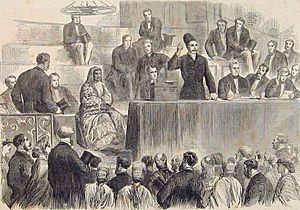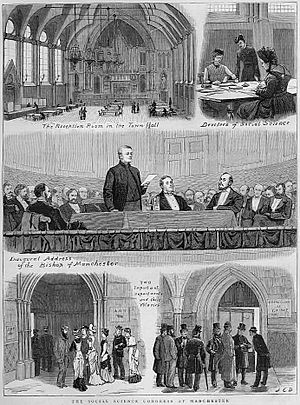National Association for the Promotion of Social Science facts for kids
The National Association for the Promotion of Social Science (NAPSS), also called the Social Science Association, was a British group started in 1857. It was founded by Lord Brougham. This group wanted to make society better. They worked on important topics like public health, fair treatment for workers, improving prisons, and education for girls. The association stopped its work in 1886.
Contents
How the Association Started
The NAPSS was formed thanks to the efforts of George Hastings. He helped bring together three different groups from the 1850s. These groups were interested in changing laws, improving prisons, and helping women find jobs.
The NAPSS was inspired by the British Association for the Advancement of Science. Like that group, the NAPSS held a big meeting every year in a different city. These meetings were a place for people who wanted to improve society to share their ideas.
The main goal of the Association was to connect experts and politicians. They wanted these groups to work together. Over time, the goals of medical reformers changed. This was one reason why the NAPSS eventually became less active. They started to focus less on new laws and government efforts for public health.
The first secretary of the group was Isa Knox.
Yearly Meetings: The Social Science Congresses
The National Association for the Promotion of Social Science held 28 big meetings. These were called Social Science Congresses. Each year, they met in a different city and had a special president.
| Year | Location | President |
|---|---|---|
| 1857 | Birmingham | Lord Brougham |
| 1858 | Liverpool | Lord John Russell |
| 1859 | Bradford | Earl of Shaftesbury |
| 1860 | Glasgow | Lord Brougham |
| 1861 | Dublin | Lord Brougham |
| 1862 | London | Lord Brougham |
| 1863 | Edinburgh | Lord Brougham |
| 1864 | York | Lord Brougham |
| 1865 | Sheffield | Lord Brougham |
| 1866 | Manchester | Earl of Shaftesbury |
| 1867 | Belfast | Lord Dufferin and Clandeboye |
| 1868 | Birmingham | Earl of Carnarvon |
| 1869 | Bristol | Sir Stafford Northcote |
| 1870 | Newcastle | Duke of Northumberland |
| 1871 | Leeds | Sir John Pakington |
| 1872 | Plymouth | Lord Napier |
| 1873 | Norwich | Lord Houghton |
| 1874 | Glasgow | Lord Rosebery |
| 1875 | Brighton | Lord Aberdare |
| 1876 | Liverpool | Marquess of Huntly |
| 1877 | Aberdeen | Earl of Aberdeen |
| 1878 | Cheltenham | Lord Norton |
| 1879 | Manchester | James Fraser |
| 1880 | Edinburgh | Lord Reay |
| 1881 | Dublin | Lord O'Hagan |
| 1882 | Nottingham | George Hastings |
| 1883 | Huddersfield | Sir Richard Temple |
| 1884 | Birmingham | George Shaw-Lefevre |
| 1885 | No meeting | N/a |
Important Committees
Looking at Workers' Unions and Strikes
One committee of the Association wrote a report in 1860. It was called Report on Trade Societies and Strikes. This report was highly praised. Later, famous historians Sidney and Beatrice Webb said it was the best collection of information about workers' unions. It also gave a very fair view of their actions.
Three Christian Socialists helped with this report. They were Thomas Hughes, John Malcolm Forbes Ludlow, and F. D. Maurice. Thomas Hughes was one of the two secretaries for this committee. The committee also included politicians like William Edward Forster and Sir James Kay-Shuttleworth. There was also one trade union member, Thomas Joseph Dunning.
The Quarantine Committee
The Association also created a Quarantine Committee in 1858. This committee looked into ways to stop the spread of diseases. Their official report was even published by the British Parliament.
 | Delilah Pierce |
 | Gordon Parks |
 | Augusta Savage |
 | Charles Ethan Porter |



